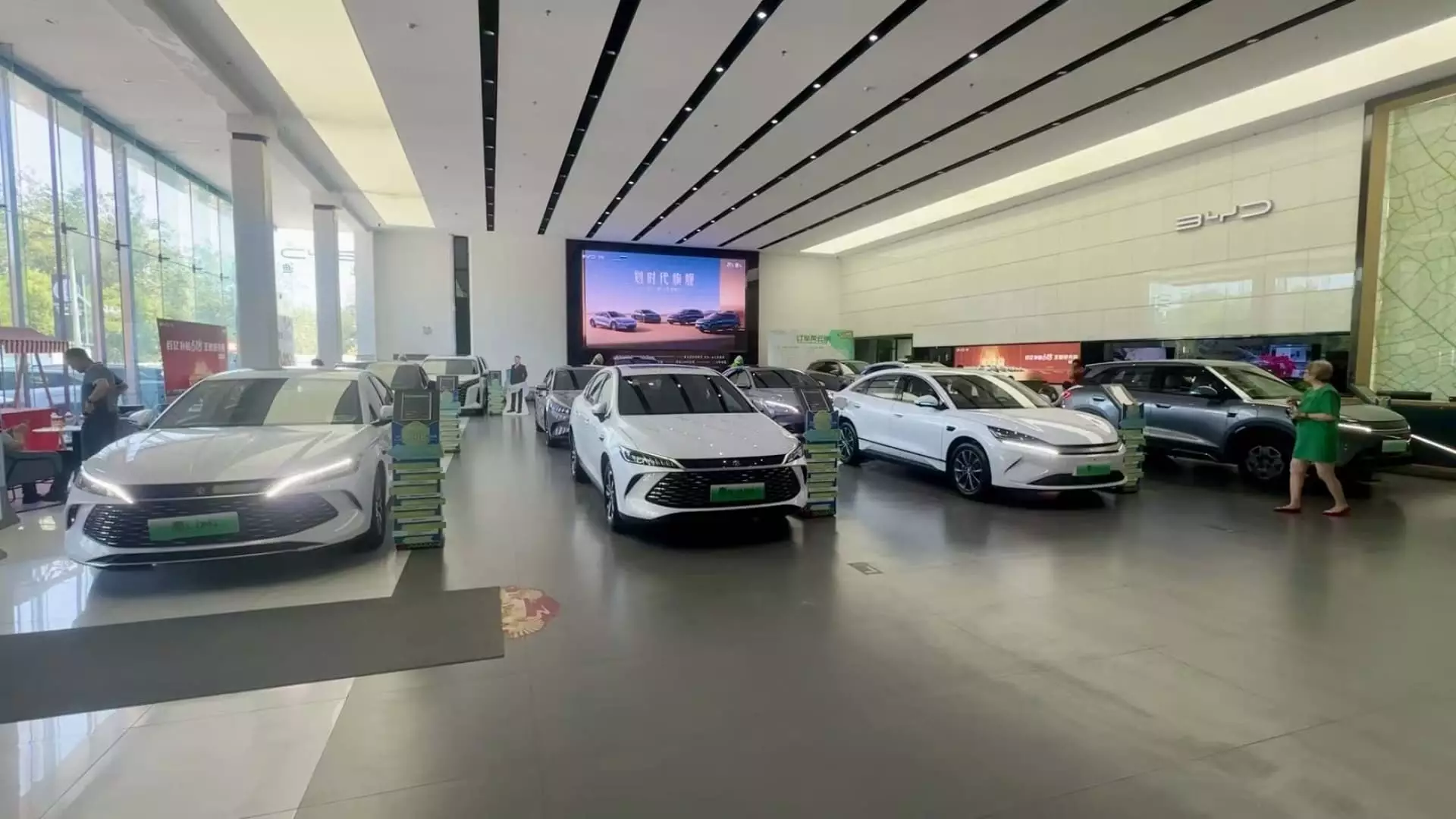The excitement surrounding China’s electric vehicle (EV) industry is palpable—infused with the promise of innovation and sustainability, it seemed poised to revolutionize transportation. Yet, beneath this gloss of opportunity lies a troubling reality: a brutal price war is threatening to undermine the integrity of the market. In such a high-stakes environment, which should be fostering growth and consumer confidence, we find ourselves instead witnessing a dangerous race to the bottom. If this trajectory continues, the repercussions could be monumental not just for car manufacturers like BYD but for the entire Chinese economy.
Salesman Ma Hui’s observations at a used car market in Beijing highlight the grim circumstances facing dealers, many of whom are teetering on the brink of financial devastation. With profits plummeting and businesses struggling to remain afloat, Ma articulates a fear shared by many—that this price-slashing frenzy will prove unsustainable in the long run. The excessive proliferation of EV companies in China, each trying to capture a volatile market, has spurred a flurry of aggressive pricing strategies.
The Flawed Model of Competition
Although competition is often heralded as a driver of innovation, the current landscape of China’s EV market reflects a troubling distortion of this ideal. Price wars might appear beneficial for consumers in the short term, but the hidden costs—job losses, reduced quality, and even fiscal instability—paint a far more ominous picture. China’s auto industry is now grappling with what some describe as an “Evergrande-like” crisis; a precarious situation ripe for chaos, reminiscent of the catastrophic repercussions felt in the property sector.
One glaring example of this disruptive trend is BYD, the market leader that recently instituted drastic price cuts—some as severe as 34%. While such discounts may entice budget-conscious consumers, they come with a price: the long-term viability of the companies involved. It’s short-sighted for any industry to prioritize immediate sales figures over the sustainability of their operations. The repercussions of such reckless behavior inevitably lead to a toxic ecosystem that compromises the quality and reputation of the industry as a whole.
Facing the Chilling Effects of Price Cuts
The internal sentiments voiced by experts and industry executives reveal an alarming consensus: this unchecked competition has morphed into a perilous cycle that could choke the very entity it is intended to promote. The China Association of Automobile Manufacturers has stridently urged companies to refrain from “dumping” vehicles—essentially selling below production costs—in a blatant attempt to quash the chaos that prevails within the market. Their warning reflects a desperate plea for stability, but whether it will resonate with enterprises like BYD remains to be seen.
Ma’s insights suggest that the wave of price cuts might inadvertently discourage consumer spending, creating a paradox where buyers hesitate to act in anticipation of even steeper discounts. Such an outlook complicates the market’s recovery and risks solidifying a negative consumer sentiment that could linger long after the price war subsides. The fear that today’s low prices could lead to tomorrow’s financial ruin is palpable among sellers, with many wondering whether they can weather this storm of their own making.
The Role of Regulation and Responsibility
In such an overwhelming and chaotic business environment, the role of government regulation becomes increasingly important. While the state has traditionally guided industries toward sustainable growth, it now finds itself at a crossroads, having to intervene decisively to prevent long-term damage. The People’s Daily editorial warned of the perils that accompany pointless skirmishes for market share, intertwining ideological discipline with economic health.
The tough questions must be asked: What responsibility do leaders hold in shaping an industry culture that prioritizes financial prudence over fleeting gains? Can firms like BYD pivot away from short-term profit maximization strategies toward a more sustainable model that not only preserves their brand but also secures the welfare of their workforce and customer base?
The path ahead for China’s electric vehicle industry is fraught with uncertainty, and unless rooted in responsible practices, this frantic competition may yield disaster. Our collective economic future depends on the choices made in this crucial juncture—choices that will either propel us toward an innovative tomorrow or plunge us into irreparable chaos.

